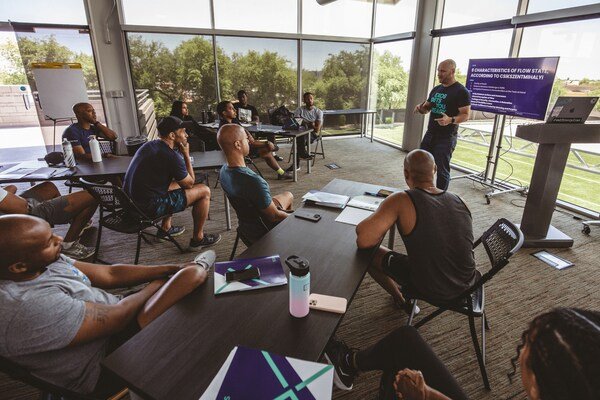Exos, the industry-leading performance coaching company that is helping organizations reimagine the future of work, releases the results of their four-day workweek pilot. Collected in partnership with the Wharton School of Business' Adam Grant and doctoral candidate Marissa Shandell, the data reveal that pro-recovery practices can support employee well-being and sustain workplace effectiveness.
Last spring, Exos released the evidence-based Readiness Culture Code as a tool to help coach their employees to think differently about how they approach work. Accompanying this was the announcement of a four-day workweek pilot, which was complimented by the implementation of intentional scheduling, meeting auditing, daily microbreaks, and other tactics aimed at maintaining business effectiveness while adding recovery and flexibility into each employee's day.
The pilot results showcase how Exos' data-informed methodology and approach could be a solution for other employers looking to reform their workplace, reverse the exhaustion modern employees are facing, and retain top talent. Key learnings from the study include:
- Even with the shift to a four-day workweek, Exos' sales pipeline grew 211% YoY from July to December. Improving the incremental sales pipeline YoY to such a dramatic degree demonstrates Exos not having to sacrifice the well-being of their employees to reach their business goals.
- Following the implementation of flexible scheduling with Exos' You Do You Fridays, 91% of employees believe they spent their time effectively at work, whereas only 64% of employees felt this way before the pilot.
- By enabling a work environment that allowed for deep-focused work, 91% of employees believed they were productive at work as opposed to only 67% before the pilot.
- 34pt reduction in the percentage of employees who experience burnout at least some of the time — from 70% before the pilot to 36% after.
- Exos' YoY employee retention rates dramatically improved with turnover rate* going from 47% in 2022 to 29% in 2023.
- *Because of seasonality and changes in facility needs, industry turnover skews significantly higher.
- Exos maintained an industry-leading Member NPS score of 71 from 2022 to 2023, indicating consistent output and sustained employee performance throughout the study.
"It's impossible for leaders to ignore the many challenges today's workforce is facing. Problems like exhaustion, high levels of stress, and an unprecedented pace of change are all causing workers to burnout in record numbers," says Exos' CEO, Sarah Robb O'Hagan. "Now more than ever, corporations have the responsibility of rethinking how they're getting employees ready to meet the ever-evolving workplace demands while sustaining performance over the long term. The answer is employee readiness, and these data findings further solidify the importance of cultivating and investing in a pro-recovery culture where employees are future-fit and ready to give their fullest each day."
One major differentiating aspect of this research was the incorporation of manager appraisals. Even with fewer working days, manager appraisals reflected the same level of performance before and after the pilot period. This adds an alternative perspective that goes beyond self-reported data, giving Exos a well-rounded view of performance. Exos employees felt better about their work and their managers saw consistency in their performance.
As part of the data release this month, Exos will introduce their Readiness Index. Revising their Employee Pulse Survey allows them to include a Readiness Index so they can monitor their employees' readiness and make sure they are offering the right support — in addition to traditional employee survey questions around trust, loyalty, and intent. This extension of their employee pulse survey was built to gather regular employee feedback across four key areas: clarity of goals, individual capacity, functional state, and workplace environment in order to continue monitoring employee readiness and well-being. The survey incorporates questions that have been tailored to provide team leaders with tangible insights that will be used to adapt employees' specific working conditions for optimal readiness and performance.
"Many leaders are reluctant to rethink the way they've always done it. Working with Exos was a breath of fresh air. Instead of preaching their "best practices" and prosecuting alternative approaches, their team was eager to explore and experiment with new ideas, and make changes based on the results. Exos has exemplified what it takes to build a learning organization," says Adam Grant, organizational psychologist and Wharton School of Business professor.


Comments powered by CComment